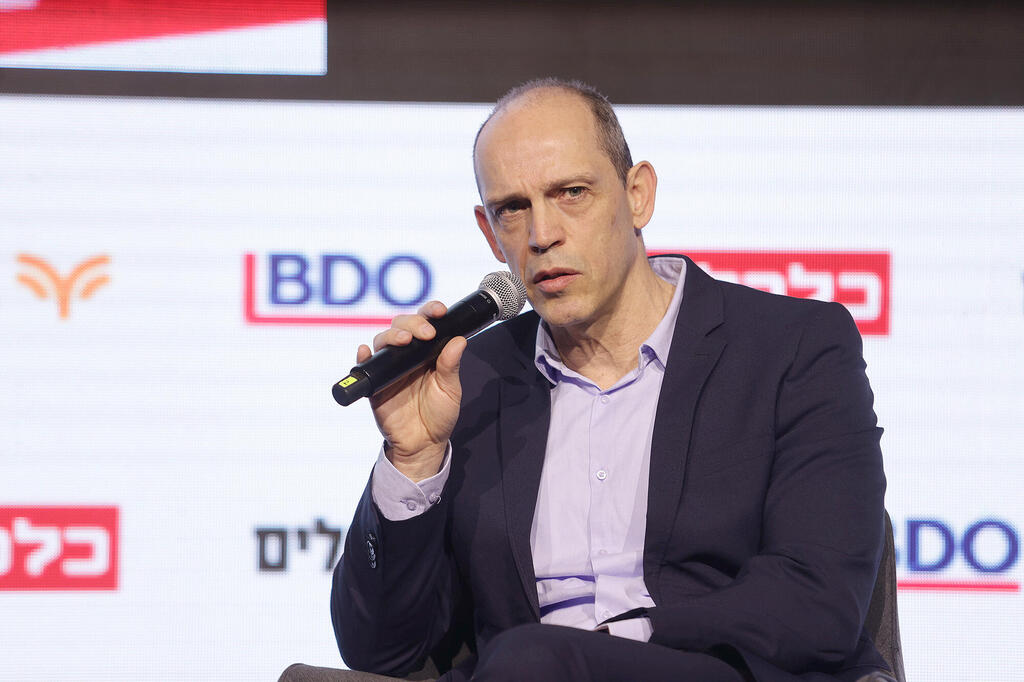
Bank of Jerusalem CEO on the real estate market: "Vulnerable entrepreneurs will go bankrupt"
Yair Kaplan spoke at Calcalist, the Bank of Jerusalem, and BDO’s Economy of Tomorrow event about the future of the real estate market, saying that “the government must act preemptively and activate the Housing Cabinet.”
"The real estate sector has entered a perfect trap," says Yair Kaplan, CEO of the Bank of Jerusalem, at Calcalist, the Bank of Jerusalem, and BDO’s Economy of Tomorrow event. "After the sharp interest rate hike over the past year and a half, many entrepreneurs have already experienced difficulties financing. Now, there is also a supply problem as there are no workers. The Knesset is discussing bringing in foreign workers, but it will be difficult to find workers willing to come during a war, and these are workers who need training, and that takes time…so, there's a combination of funding difficulties and prolonged construction delays, and as a result, entrepreneurs will face challenges."
Are we at a crisis-level for small entrepreneurs?
"Some vulnerable entrepreneurs will go bankrupt. We are already seeing problems. I estimate we will see more. The government must act strategically and activate the Housing Cabinet – which has only convened once under this government. There is a long-term problem here - a demand for 60,000 housing units per year no matter what and there is not enough supply. In the medium and long term, I only see prices increasing."
The war caught the economy by surprise, but there is a general feeling that the banks were the first to understand the situation. Tell us a bit about your perspective as the CEO of a bank.
"We were prepared for such an event, even though we didn't anticipate it. Like the government, we also have a war cabinet – the bank's management – that met daily. We had to make many decisions: what to do with branches closing in the south and how to support them, how to ensure cash availability in ATMs, what to do when 10% of the workforce – reservists or spouses of reservists – are called to service, and you need to provide support, how to support the availability of the bank’s system and assist customers. I think the system was effective. We adopted the Bank of Israel directive overnight, and within a few days we approved the final details. The banking system is usually used as a punching bag, so at this time, it's good that the banks are stable because they can help."
Turning to the macro level, there is an updated war budget approved by the government, and now it needs to pass in the Knesset. There is a projected deficit of 6.6% in 2024. Is there anything, in your opinion, that should have been done differently?
"We entered the war in a good position, with a low debt-to-GDP ratio, and even if it rises to 67%, it will still be among the lowest in the OECD. Problems present opportunities – and we have a tremendous opportunity here. Often after wars, there is growth; on the other hand, there was also the lost decade after the Yom Kippur War. So, the question is where we take it. If the government invests in growth-promoting sectors – increasing productivity, infrastructure, rebuilding the Gaza periphery – we can grow and be very successful."
You joined the loan fund for small and medium businesses last year with a state guarantee, and now you are also providing loans as part of war relief. Are there areas where it's harder to provide credit?
"We provide credit in all industries. Of course, there are high-risk sectors where it's challenging to grant credit, like tourism, events, entertainment, where the uncertainty about what will happen is enormous. In the end, we assess risk, and it's challenging to price risk for businesses in the Gaza periphery or for tourism businesses if you don't know whether you’ll return. In such cases, the government can provide creative solutions, such as increasing the guarantee rate."
The past two years have been years of revolution in the banking world, with the removal of barriers between banks and open banking. How does a small, veteran bank like yours perceive these changes?
"There is a global trend to unload products: customer loyalty disappears, and they choose a product that suits them from any bank that suits them. This trend is also permeating Israel, through regulatory changes like instant transfers, open banking, etc., allowing smoother transitions. We decided to package our capabilities into a new unit called 'banking as a service,' so any company, not just financial, even a cellular company with a database of millions of customers, can make use of it. If in the past, cellular companies provided all the needs – the phone itself and all the content – today they are just a platform. So, banks will also be a platform and provide services to any customer who wants them. We have underwriting, operations, collection and product accessibility capabilities."














